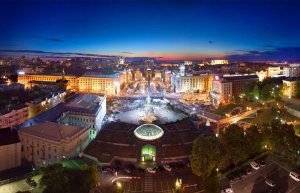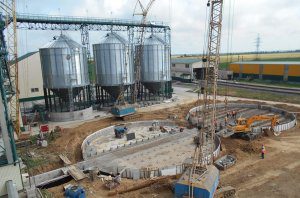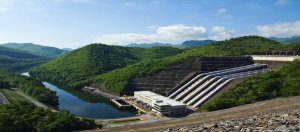
(Nikopol, Ukraine) – June 12, 2017, TIU Canada Ltd. Broke ground on a 10-megawatt solar energy plant in Nikopol, Ukraine. The project represents the first investment by TIU Canada in Ukraine and the first Canadian investment under the Canadian-Ukrainian Free Trade Agreement. TIU Canada is owned and operated by the family office of Refraction Asset Management (RAM), an investment manager based in Calgary, Alberta Canada.
Michael Yurkovich, President of Refraction Asset Management, said, “we are pleased to take this first step in the Ukrainian renewable energy market”. Hani Tabsh, Chief Operations Officer for RAM read a letter from the Canadian Embassy in Ukraine addressed to the Nikopol City Council (attached) which cited this investment as “the start of a fruitful partnership which benefits all of Ukraine”. Nikopol Mayor Andriy Fisak, representatives from the Dnipro Oblast State Administration, and other local officials and media were also present for the event.

KYIV. June 12 (Interfax-Ukraine) – The economy of the city of Kyiv expects to attract over $4 billion in foreign investment this year, Kyiv City State Administration’s press service has said.
“Foreign direct investment (equity capital) injected in the city’s economy in 2016 exceeded $3.6 billion, which was 13.3% up on FDI in 2015($3.2 billion),” the press service quoted First Deputy head of Kyiv City State Administration Hennadiy Plis as saying.
The most attractive sectors are insurance, finance, commerce, and real estate, he said.

KYIV. June 12 (Interfax-Ukraine) – Allseeds group of companies has started building the second stage of a multifunctional soybeans processing plant with a processing capacity of 5,000 tonnes per day at Yuzhny port (Odesa region).
According to a company press release, the construction of the plant and bringing its infrastructure to the necessary parameters will take about three years.
“The commissioning of such an enterprise means that in the course of the year the company will need in addition to the available volumes to bring and take, accept and send about 1.7 million tonnes of raw materials and finished products – meal and oil – per year,” the press release reads.
Given this factor, it is planned to make additional investments in the development of infrastructure of the oil complex in Yuzhny port: elevators, warehouses, tanks and railway facilities.
According to the report, the build-up of processing facilities will enable Allseeds to obtain a synergistic effect, increase business efficiency by substantially saving conditionally constant expenses per unit of output and ultimately to become more competitive.
“With the processing volume of about 2.5 million tonnes per year, Allseeds will become company number two in the oilseed market of Ukraine. The total amount of its investments in Ukraine will reach $400 million,” the company said.

KYIV. June 12 (Interfax-Ukraine) – PJSC Ukrhydroenergo plans to attract investors in the construction of the fifth, sixth and seventh hydroelectric units at Dnistrovska pumped storage power plant, company CEO Ihor Syrota has told journalists in Vyshgorod.
“I think we will attract investors in building the fifth, sixth and seventh power units and will not build them for tariff funds. These units can be built simultaneously, the construction period is about 4-5 years,” he said.
Syrota noted the design and capacity of these power units will differ from the first, second, third and fourth ones.
“We are considering other units. If the capacity of the first-fourth power units in a generation mode is 324 MW and in a pumping mode is 421 MW, the new ones will be of 250 MW and 260 MW respectively, which will be economically more profitable. In addition, we want to foresee another range of regulation from 150 MW to 250 MW,” he said.
The head of Ukrhydroenergo expressed confidence that Ukrainian producers will be able to master the production of new hydro power units.

KYIV. June 12 (Interfax-Ukraine) – PJSC Borschahivsky Chemical and Pharmaceutical Plant has won a tender of the United Nations Development Program (UNDP) for the supply of two antituberculous drugs Rifampicinum and Ethambutolum.
According to a report on the plant’s website, the total cost of medicines is UAH 3.6 million. According to the contract, the plant must deliver the drugs no later than July.
The company said it plans to deliver the drugs prior to the specified date – in June.
“We are convinced that the mechanism of holding tenders through international organizations works. Any pharmaceutical manufacturer that is able to provide high-quality products at an affordable price has a chance to win,” the press service said citing plant commercial director Yevheniy Sova.

ASTANA. June 12 (Interfax-Ukraine) – Since the beginning of 2017, mutual trade between Ukraine and Kazakhstan, depending on the category of goods, has shown an increase of 15-25% compared to the figures for the same period in 2016, Charge d’Affaires of Ukraine to Kazakhstan Volodymyr Dzhydzhora has said.
“Since the beginning of this year we have seen an increase of trade turnover between Ukraine and Kazakhstan over the previous year. This ranges from 15 to 24-25% in different directions,” he told journalists in Astana on Friday.
The diplomat said that in 2016 the total volume of trade in goods and services between Ukraine and Kazakhstan amounted to $926.7 million, which is 21.2% less than in 2015.
According to Dzhydzhora, such a decline in the Ukrainian-Kazakh trade turnover last year was due, in particular, to a decrease in the solvency level of the Kazakh business due to the fall in oil and gas prices, the weakening of the Ukrainian economy in connection with the fighting in Donbas and actions of the Russian Federation within the framework of its “counter-sanctions” because of which the prices for transit services increased.